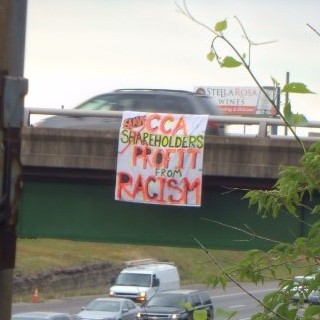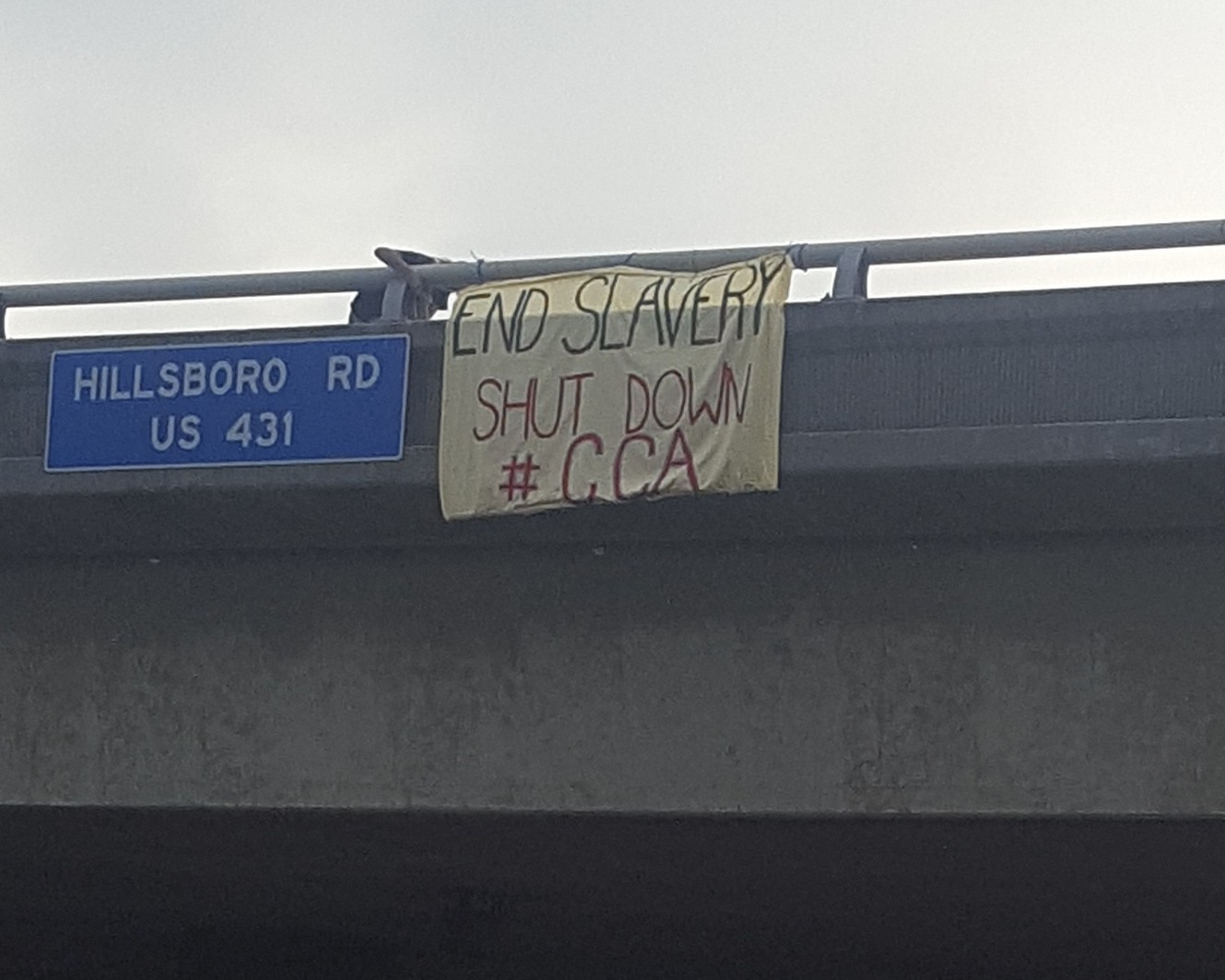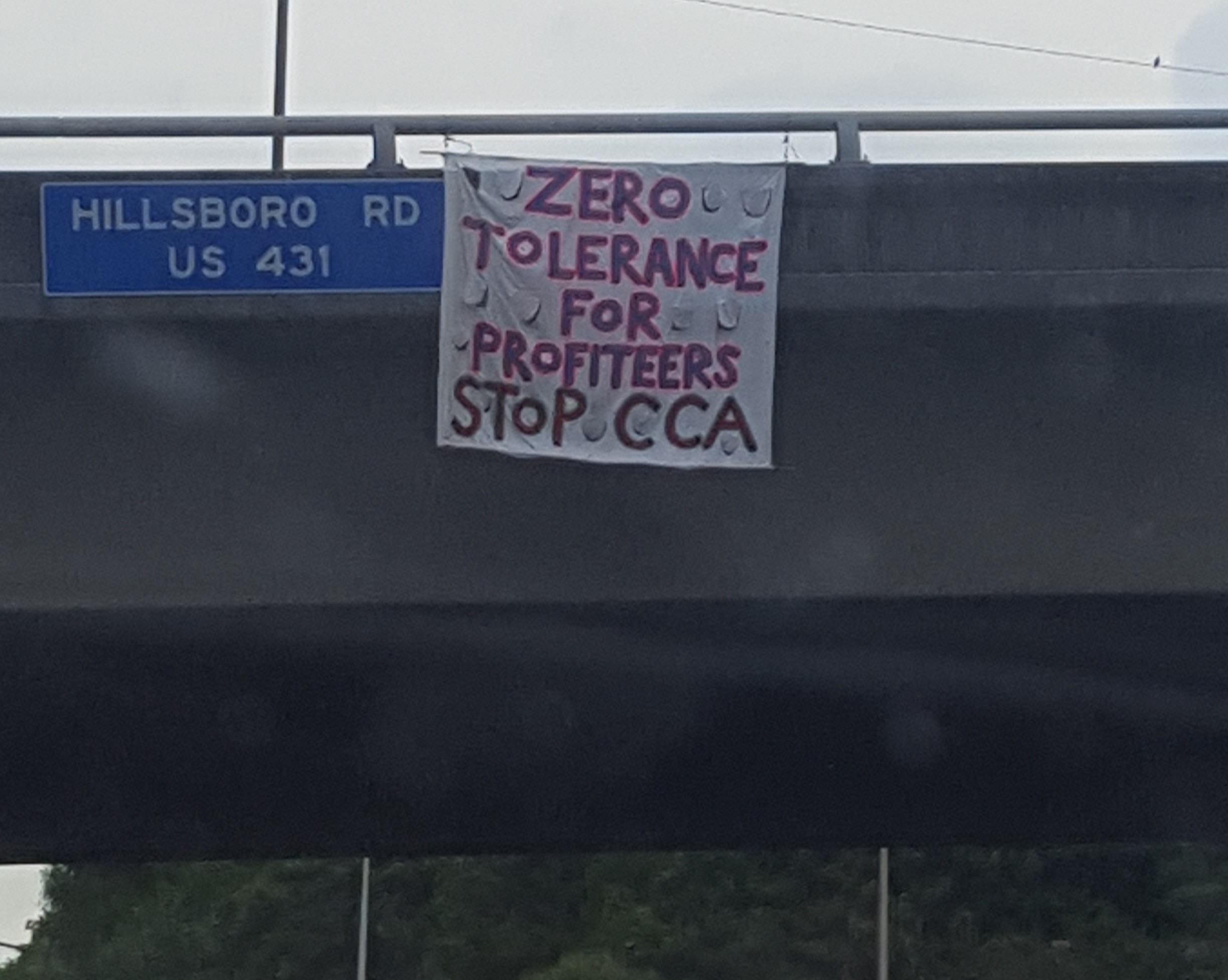Submitted to It’s Going Down
A feisty group of protestors took on the annual shareholder’s meeting of the Corrections Corporation of America (CCA) in Nashville on May 12th. Among the 50 to 60 people who gathered were former prisoners from CCA facilities, religious radicals, members of peace and justice groups, and a large contingent of rural queer and trans folks, including many anarchists.
One contingent held a steady presence by the entrance to the meeting at the CCA corporate headquarters, confronting shareholders and employees as they entered and exited, and hearing from a number of speakers discussing private prisons and exploitation. Another rowdy crew marched to a nearby major road and disrupted traffic, blockaded the road leading to the CCA headquarters at two different intersections, and confronted police before marching back to rejoin the rest of the protest. An activist shareholder from Prison Legal News returned to the demonstration and reported on the proceedings inside, and energetic protesters harangued the profiteers as they left the parking lot.
Attendees at the demonstration distributed literature about CCA’s slimy profiteering from racist mass incarceration, their role in promoting policies that maximize sentences and destroy communities, scandals around corruption, riots, and deaths in their facilities over the last year, and the particularly terrible conditions in CCA prisons that stem directly from their profit motive, as minimizing expenses on health care, food, and other basic necessities translates directly into more money for their shareholders. Protesters also promoted the upcoming national prison work stoppage planned for September of this year, handing out hundreds of copies of “This is a Call to Action Against Slavery in America.”
At least four banners were dropped the morning of the demonstration along Nashville area highways dissing CCA’s racist prison profiteering. Here are some pictures:




Also, CCA employees arrived at the headquarters that morning to find that their elegantly flowing fountain was stained blood red. They shut it off, but the grim spectacle of the bloody pool was unavoidably visible to all of the entering shareholders as well as protesters and passersby. Interested parties might wish to note that dyeing fountains as a complement to anti-corporate protests is very easy, quick, visually striking, and hard to undo.
Some of the questions this demonstration raised for us:
As antagonists in middle Tennessee, an area of the country not noted for active resistance – not in this century, at least – how much should we prioritize cultivating ongoing relationships with others with whom we share (at least some) political ground at the expense of a wider range of tactics, versus pursuing confrontational action regardless of the social cost?
This demonstration revealed some of the tensions among folks from different political perspectives who are interested in challenging prison profiteers. When a member of a local peace and justice group attempted to lead a chant of “Hey hey, ho ho, private prisons have got to go!”, others edited the chant to “ALL prisons have got to go!” While most of the feedback the blockaders heard from other protesters was positive, we’ve also heard informally about some blow-back from peace and justice liberals who would have preferred a tamer protest.
In the flyers and literature we produced for the demonstration, we tried to strike a balance, including links and references to Prison Legal News and the anti-CCA divestment campaign as well as PIC-abolitionist resources and information about solidarity with prison rebels. Our strategy was to try to meet folks where they’re at while offering info on more radical perspectives on resistance to incarceration (whether public or private). It remains to be seen how effective this will be.
Another set of questions arose around the extremely mild response of the police. In the aftermath of the Ferguson and Baltimore rebellions, police departments around the country have responded in quite divergent ways. While some intensify their militarization and immediately deploy maximum force against any potentially disruptive activity, others are taking a page out of the “community relations” playbook, attempting to cultivate a friendly and pro-free speech image as a means of minimizing conflict. The Nashville Police Department is definitely on this page. From the very beginning, the police summoned to the scene quite earnestly tried to convince us that we’re on your side, we understand where you’re coming from, we support your right to protest (peacefully), we just need y’all to get out of the road. In fact, it would help you get your message across more effectively if you weren’t annoying these ordinary folks who’re just trying to get to work by blocking traffic! C’mon, y’all, pleeeease?
One of the funniest moments of the demo took place when a police sergeant pleading with blockaders to get out of the road was told that the person they were pleading with was an anarchist.
Cop: “So that means you don’t recognize any legitimate form of authority, more or less?”
Protestor: “Yeah, basically.”
Cop: “Well, believe it or not, I’m actually a lot more in line with that than you might think. No, really! But still, even so, you’ve got to agree that we at least need to have SOME rules, right?”
For those of us who cut our teeth at the Miami FTAA or SHAC campaign protests, this is not the kind of interaction we’re accustomed to having with police! We were able to block or delay traffic right around the corner from our target for well over an hour, and directly and bodily defy explicit police orders without any arrests. This has us wondering about the most strategic way to use this unexpected capacity for disruption with minimal consequences. For those of us facing police departments that are desperate to avoid Ferguson-type explosions, whose counter-insurgency strategy relies more on minimizing arrests and positioning themselves as defenders of (peaceful) free speech, we may be able to plan more ambitious coordinated actions and disruptions than we’d anticipated possible.
We don’t have any illusions that CCA or its shareholders give a hoot about us. But we were able to embarrass and harass the attendees at the meeting, to disrupt traffic and daily life around it, to connect with others who’re outraged about prison profiteering and to expand the range of tactics we felt entitled to use. We also began building towards the September national prison strike, which we hope will catalyze thousands of people both inside and outside the prison walls to take action against all of the institutions and individuals that keep incarceration, capitalism, and white supremacy running day after day.
